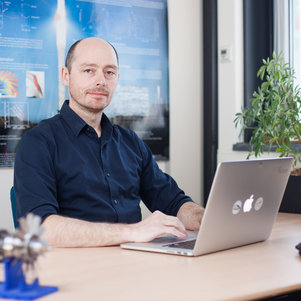Inaugural lecture: ‘Fundamental knowledge on thermal fluid science is crucial to accelerate the energy transition’
Many technologies that contribute to the energy transition are constantly being re-engineered to perform ever better. This often involves fluids being pushed into the ‘supercritical region’. In his inaugural lecture on January 19, TU Delft professor of Thermal and Fluids Engineering, Rene Pecnik, states that providing more fundamental insight into thermal fluid science is needed to design highly efficient and reliable equipment that contribute to the energy transition.
According to Rene Pecnik, who works at the faculty of Mechanical Engineering, one of the greatest challenges the coming years, is to make the process industry sustainable. This type of industry provides the products that we depend on in our daily lives. Compared to other sectors, such as transportation or the residential sector, the industrial sector is often viewed as the most challenging to decarbonize. “Since the industrial revolution, factories have grown in scale and now contain a vast array of complex processes that heavily rely on fossil fuels”, says Pecnik. “It is time to ignite new ideas and develop technologies that will enable a sustainable transition.”
Supercritical fluids
In the energy transition, he sees it as his role to provide fundamental knowledge in thermal fluid engineering. Pecnik’s main objective is to understand the intricate flow and heat transfer phenomena in future energy systems. In these systems, fluids are often pushed into the ‘supercritical region’. “This means that due to extreme pressure, it is no longer possible to differentiate between the liquid and gas phase. This makes it very challenging to predict the heat transfer or pressure losses accurately, hindering the efficient design,” says Pecnik.

Rene Pecnik
Building bridges
To understand the fluid flow/heat transfer better, Pecnik uses a combination of advanced analytical methods, large scale numerical simulations, and unique experiments. For example, the fluid lab enabled by his ERC grant, will allow unprecedented measurements of heat transfer to experimentally confirm complex phenomena Pecnik and his group analytically and numerically discovered. In his work, Pecnik combines fundamental and applied research. “It is my aim to bridge these two areas of research by providing fundamental knowledge in thermal fluid science that will enable breakthrough technologies to accelerate the energy transition.”
Follow the inaugural lecture live or rewatch it via this link.